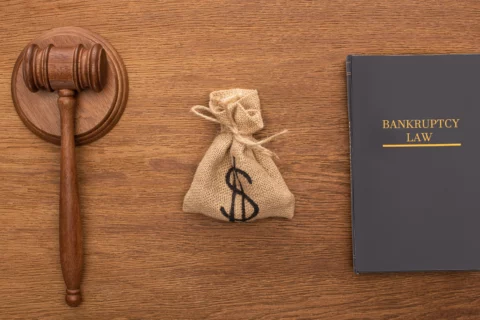Chapter 7 Qualifications
Discover Financial Freedom with Chapter 7 Bankruptcy.
Feeling overwhelmed by bills? Struggling to keep your head above water financially? You’re not alone. Millions of Americans face crushing debt, leaving them feeling hopeless and unsure where to turn. If this sounds like you, Chapter 7 bankruptcy might be a lifeline you didn’t know existed.
But before you dive in, it’s crucial to understand who qualifies for this type of bankruptcy. Remember, it’s not a magic solution that erases all your financial troubles, but it can provide a fresh start by eliminating certain debts.
Short Summary
- Chapter 7 bankruptcy in offers a potential solution for those overwhelmed by financial burdens, subject to stringent qualifications, including a means test evaluating income against the state median.
- Understanding the nuanced criteria, such as debt types, exemptions, and potential asset implications, is crucial for individuals considering Chapter 7, ensuring informed decisions in the pursuit of debt relief.
- Qualifying for Chapter 7 involves meeting conditions like the means test, understanding eligible debt types, and navigating exemptions and non-exempt property considerations.
- Successfully navigating Chapter 7 qualifications requires a detailed analysis of financial situations, income, and debt nature.
What is Chapter 7 Bankruptcy?
Chapter 7 bankruptcy, often referred to as “liquidation bankruptcy,” is a legal process designed to offer individuals a fresh start by discharging certain debts. Under Chapter 7, a trustee is appointed to oversee the liquidation of non-exempt assets, with the proceeds used to repay creditors. It’s important to note that Chapter 7 cannot discharge all debts. You may still need to pay certain obligations.
Chapter 7 Filing
Choosing Chapter 7 bankruptcy is common for its speed and cost-effectiveness. It’s a quicker process, usually taking only a few months, and you don’t have to pay anything to creditors. People with necessary belongings qualify for Chapter 7, but the trustee may sell valuable assets to pay creditors. Items such as an RV or baseball card collection might be included. Your home or car could also be affected if there’s too much equity.
Unlike Chapter 13, Chapter 7 doesn’t offer a payment plan for overdue mortgage or car payments, so if you’re behind on your loan when you file, there’s a risk of losing your home or car.
How Do I Qualify for Chapter 7 Bankruptcy?
Meeting certain conditions is necessary to qualify for bankruptcy. If you’ve filed before, you need to check if enough time has passed to file again since you’re only allowed a discharge every few years. The waiting period depends on the chapters involved.
Meeting specific chapter requirements is also essential. Let’s go over the basic qualifications for Chapter 7:
Means Test
Chapter 7 bankruptcy eligibility is determined in part by the means test. It looks at your income compared to the state’s median. If your income is below the median, you may automatically qualify for Chapter 7. If your income exceeds the median, further analysis of your disposable income and specific expenses will be conducted. This is to assess eligibility.
Types of Debts
Chapter 7 bankruptcy is most effective for unsecured debts such as credit card balances, medical bills, and personal loans. It’s crucial to understand which debts can be discharged. Some obligations, such as child support and recent taxes, may not qualify.
Exemptions and Non-exempt Property
Bankruptcy law provides exemptions that allow individuals to retain specific assets necessary for daily life. Common exemptions include a primary residence, personal belongings, and retirement accounts. However, non-exempt property may be subject to liquidation to repay creditors. It’s crucial to understand exemptions and how they affect your assets. This helps in assessing if you’re eligible for Chapter 7.
To navigate Chapter 7 qualifications in Illinois, you need to analyze your financial situation, income, and debt nature. This helps determine your eligibility.
What Should I Avoid Before Filing for Chapter 7 Bankruptcy?
When getting ready to file for Chapter 7 bankruptcy, it’s important to use common sense. Avoid paying creditors or taking on new debt. A new creditor might argue that you borrowed money without intending to pay it back, potentially resulting in a fraud claim. It’s important to create a budget and adhere to it, avoiding any unusual transactions. Additionally, refrain from accessing your retirement funds.
Is Chapter 7 a Good Fit for You?
This is a big decision. In simple terms, filing for Chapter 7 is a good idea if you have a lot of debt and still own valuable things that the law protects. Once you reach the point of considering bankruptcy, you’ve likely already sold off things that aren’t protected by the law. So, if you have mostly essential stuff left, going ahead with Chapter 7 can be a smart move.
Call Us and We’ll Guide You in Finding Out Whether You Qualify for Chapter 7 or Not
Understanding your eligibility is crucial when navigating Chapter 7 qualifications. It can be a challenging journey, but knowing if you qualify is essential.
At Cutler & Associates, Ltd., we are dedicated to making this process seamless for you. Discover if Chapter 7 is the right path for you – our team at Cutler & Associates, Ltd. is here to guide you through every step. Don’t let financial uncertainty linger, take control with our trusted legal services.
Facing financial challenges? Seek our professional legal advice to navigate the complexities of Chapter 7 bankruptcy. Our qualified attorney can guide you through the process and address your concerns. They can help you make decisions tailored to your unique circumstances. Remember, competent assistance can be the key to achieving a fresh start.
Contact us today for free consultation and let us help you find the relief you need. Your financial freedom starts here!
Aside from our office in Aurora, we also provide bankruptcy legal services in Schaumburg, OakBrook Terrace, and Skokie, Illinois.


